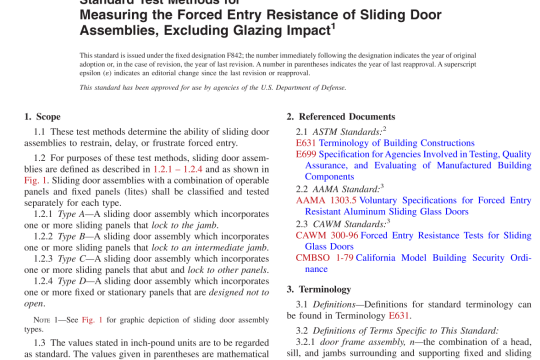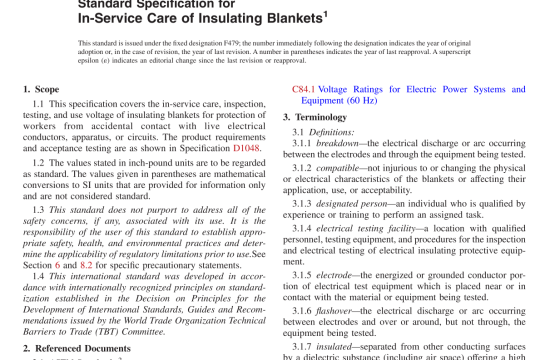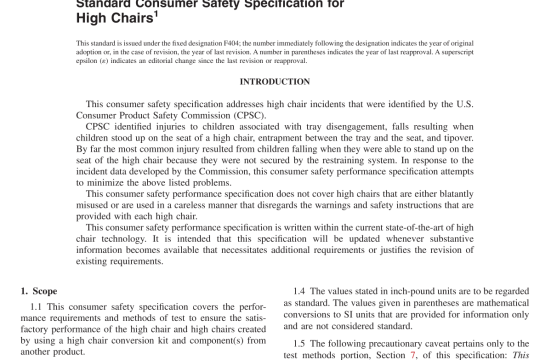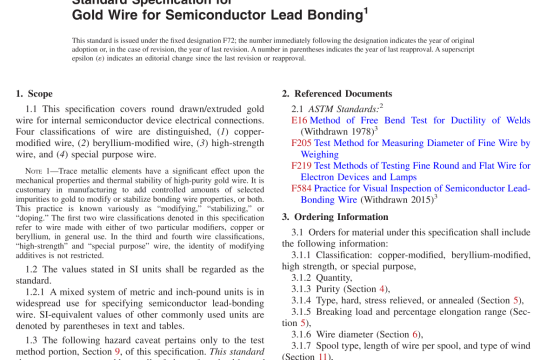ASTM E3072-2018 pdf free download
ASTM E3072-2018 pdf free download.Standard Terminology for Industrial Biotechnology
1. Scope
1.1 This terminology is a repository for the terms, and their standardized definitions, as relates to the technical standards generated by Committee E62 on Industrial Biotechnology. The meanings and explanations of the technical terms have been written for both the nonexpert and the expert user. 1.2 At a minimum, this terminology is updated annually (at a time corresponding to the publication of the Annual Book of ASTM Standards containing this terminology standard) to include editorially any terms approved in the committee’s technical standards. 1.3 This standard does not purport to address all of the safety concerns, if any, associated with its use. It is the responsibility of the user of this standard to establish appro- priate safety, health, and environmental practices and deter- mine the applicability ofregulatory limitations prior to use. 1.4 This international standard was developed in accor- dance with internationally recognized principles on standard- ization established in the Decision on Principles for the Development of International Standards, Guides and Recom- mendations issued by the World Trade Organization Technical Barriers to Trade (TBT) Committee.
3. Terminology
aerobic fermentation, n—fermentation processes that requires the presence of oxygen. (E2363) anaerobic fermentation, n—fermentation processes con- ducted in the absence of oxygen. (E2363) biocatalyst, n—enzyme, nucleic acid, or organism capable of accelerating a chemical reaction or conversion. biochemical, n—chemical produced by biological systems. bioprocess, n—a process requiring a biocatalyst. bioproduct, n—material or product derived from a biological source or through a biological process. biorefining, v—processing systems using physical, biological (for example, fermentation), chemical methods, or combina- tions ofthese, by which biobased products are separated into partially or fully purified fractions, which may be further converted into new chemical entities. enzyme, n—protein-based molecule that is capable of catalyz- ing a chemical reaction. lignocellulosic biomass, n—biomass consisting predominantly of lignin, cellulose, and hemicellulose, for example, wood and structural vegetative components, such as plant stems. fermentation, n—the biochemical reaction process where microorganisms in a nutrient medium convert a feedstock to a product. (E2363) molar yield, n—amount of reaction product converted from a defined input chemi cal expressed in moles. percent of theoretical yield, n—amount of product, or products, obtained from a process, or multi-step process, given as a percentage of the theoretical yield from the defined input material.process yield, n—amount ofrecovered product ofinterest from a single- or multi-step process expressed as a percentage of the amount of input material either as moles or mass. remediation, n—removal of pollution, or contaminants, from environmental media such as soil, groundwater, sediment, or surface water, or degradation to non-toxic or benign status.
4. Keywords
4.1 biobased product; bioproduct; industrial biotechnology




